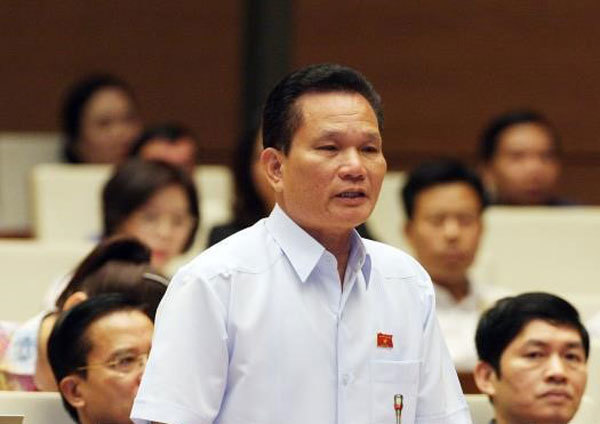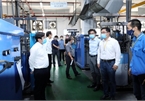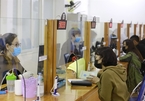How do you assess the impact of the COVID-19 pandemic on Vietnam’s labour and employment market?
Although there are no specific statistics on the number of unemployed people due to the COVID-19 pandemic so far, the current figures on bankruptcy and temporary cessation of enterprises have partly reflected the COVID-19 impact on the labour market.
 |
| Bui Sy Loi, vice chairman of the National Assembly’s Committee for Social Affairs. |
In my own consideration, there are two affected groups. The first group is the labourers who live in affected areas, cannot move into industrial parks and factories to continue working because they have to be quarantined to prevent the spread of SARS-CoV2, such as the people in Vinh Phuc Province (in February).
The second group is labourers who are working in Foreign Direct Investment enterprises, returned to their hometowns (affected areas) during the Tet (Lunar) New Year holidays and then came back to their enterprises right at the time of the outbreak of COVID-19 and were forced to be quarantined. In this case, enterprises should not only use current labourers but also have strategies to attract local labourers as well as labourers in non-affected areas to fix the situation.
If the pandemic continues, its impact on Việt Nam’s labour market is very clear. We might have to restrict foreign labourers who come from affected areas and work in Vietnam.
Besides, if we cannot import raw materials from hard-hit countries, we will obviously be affected in the short term and the short-term impacts will become long-term impacts in the future if we do not have specific solutions or if the pandemic is not brought under control.
The Government, ministries and relevant agencies have taken many measures to support enterprises to overcome the difficulties, triggered by the COVID-19 pandemic. What do you think of the support?
From the early days of preventing the COVID-19 pandemic, the Government has determined to focus on implementing a dual task: fighting the pandemic but still continuing socio-economic development.
By this time, the negative impacts of the COVID-19 epidemic on businesses, labourers and the economy are increasingly evident. The immediate action is to strictly implement the measures following Directive 11/CT-TTg, issued by Prime Minister Nguyen Xuan Phuc on March 4.
It is very important work, especially, the measures of balancing and meeting the capital demand for production and doing business; promptly applying measures for debt restructuring, considering exemption and reduction of loan interest for customers, who are facing difficulties due to the COVID-19 pandemic; operating a bailout package, worth about VND250 trillion (US$10.5 billion); as well as extending the payment of tax and land rent to those affected by the COVID-19 pandemic.
Notably, there is one more piece of support for enterprises. It is the temporary suspension of social insurance payments to the Pension and Death Fund for enterprises that meet numerous difficulties due to COVID-19 pandemic.
The ‘rescue package’ is different from all ‘rescue packages’ that the Government has done before. I think they are very good and timely policies to support the enterprises. We do not trade economic interests for life and the safety of the people. It is very true. But it does not mean that there is absolutely no economic development in the current context. We have to take every opportunity to maintain and develop the economy, in which the State’s role of ‘midwife’ is very important now.
In your opinion, what additional policies or measures are needed for labourers affected by the COVID-19 pandemic?
Some enterprises have to shut down or suspend their operation due to the impacts of the COVID-19 pandemic. It leads to the situation of unemployment or temporary unemployment in society. Therefore, we need to re-check, produce statistics and timely pay job-loss allowance for unemployed people. The allowance will help them to cover their daily costs and pay some for training courses to improve their professional skills or learn new skills to change their occupation. It is a very important thing because labourers will suffer from double difficulties if they have no income but still have to cope with the COVID-19 pandemic.
Enterprises that currently have to suspend production because they lack raw materials or are unable to export goods, can take advantage of this time to organise courses to train and improve skills for labourers. We could use a part of the nation's unemployment insurance fund to assist enterprises to do that. The fund, about VND70 trillion ($2.9 billion) now, might help both enterprises and employees to overcome current difficulties. The fund not only is used for unemployed people but also for improving labourers’ professional skills so that they could change their occupation if necessary.
We need to re-train the labour force in order to have the human resources for socio-economic development of the country, as well as to avoid the situation of labourers getting in trouble due to unemployment. Besides, when an incident or a crisis occurs, it is important to prepare human resources to meet the requirements. Our human-resource development strategy is not only short-term, not only current, but also long-term. The reason for preparing long-term human resources is because the quality of our human resources is still at a low level. Only 25 per cent of trained labourers have degrees and certificates.
To fix the problem, it needs a new approach for enterprises. The enterprises should train their labourers in an additional occupation. Then, labourers can adapt to the situation if the enterprises require. VNS/Haiquan

Thousands of workers laid off in HCM City
Nearly 7,000 workers at 33 companies in Tan Thuan Processing Zone have become unemployed due to Covid-19.

Nearly 70,000 labourers in Hanoi lose jobs amid COVID-19 pandemic
Nearly 70,000 labourers had lost their jobs amid the COVID-19 crisis as many enterprises in Hà Nội have been forced to scale down production or temporarily suspended operations, the city’s Confederation of Labour has announced.
 Bui Sy Loi, vice chairman of the National Assembly’s Committee for Social Affairs talks about solutions to support labourers after many enterprises have declared bankruptcy or been temporarily suspended operations due to the COVID-19 pandemic.
Bui Sy Loi, vice chairman of the National Assembly’s Committee for Social Affairs talks about solutions to support labourers after many enterprises have declared bankruptcy or been temporarily suspended operations due to the COVID-19 pandemic.